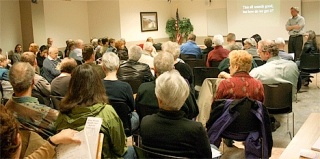Following his recent confirmation hearing, President Barack Obama’s point man on health care framed the urgency of the issue.
“The flaws in our health system are pervasive and corrosive. They threaten our health and economic security,” said former U.S. Sen. Tom Daschle, who was penciled in as Secretary of Health and Human Services before a tax scandal benched him.
With the health care crisis in America intensified by recession, a question that comes to mind is: What health plan will emerge?
Whidbey Island Democrats met Sunday at Skagit Valley College to tackle a best-case-scenario for this question. In what has traditionally been a polarizing political issue, the forum had an open approach and allowed for audience input.
The crowd of about 50 wrestled with the “big picture” topics of reform, including cost and fairness.
The discussion was lead by Larry Kalb of Bellingham, a noted activist for health care reform.
For years he has stressed his preference for a single-payer universal health care plan, which is packaged in a current bill named HR 676.
Not everyone is receptive to his message, he said. People will sometimes write it off as “socialized care” and worry they won’t get time to see a doctor. Legislators say it is too expensive, he added.
“But a lot of people really want change,” Kalb said.
Oak Harbor resident Teri Bovington is a military spouse with Tricare Standard, a care system that allows military families to seek civilian providers.
Bovington said the payout is poor, and she is struggling to find a local doctor willing to accept her coverage.
She attended the forum to hear about alternatives.
“Is our insurance system broken? Are we finding discrepancies?” Bovington said. “You don’t have to look very far, it’s here in our community.”
In Washington state, there are an estimated 563,000 people without health insurance.
Kalb said the National Health Care Act would create a publicly financed, privately delivered system that expands the existing Medicare program to all U.S. residents.
Similar to France, where Kalb lived for 10 years, he would like to see Americans receive micro-chipped cards with patient information that they could take to any hospital for treatment.
“Every step of our current health care system has profit attached. Wall Street medicine is legally bound to put shareholders financial interests first. You have a middle man with his hands in your pocketbook all the time,” he said.
He offered examples of French and Canadian health care models, each providing a universal system.
While the audience liked the idea of comprehensive, guaranteed and continuous care, there was concern about the cost.
“This all sounds expensive,” one audience member said.
“How do we keep from racking up debt?” another asked.
Kalb said in other countries, insurance and pharmaceutical companies are highly regulated and need to work within the government budget. In British Columbia, individuals pay about $54 a month but must pay extra for dental, vision and hearing.
Bovington said that while this is a hot-button topic for some people, she was happy the discussion was brought to Oak Harbor.
“I just want people to understand the gravity of what’s going on. Some people don’t understand it because they already have coverage,” she said.
Sunday’s event was sponsored by the Whidbey Island Democratic Club.
Event organizer and vice-chair of the club, Trudy Sundberg said the event was designed to inform voters of this issue.



